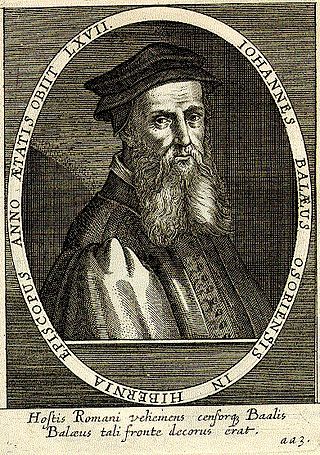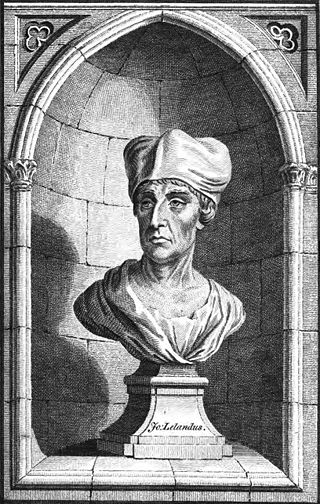Related Research Articles

John Bale was an English churchman, historian and controversialist, and Bishop of Ossory in Ireland. He wrote the oldest known historical verse drama in English, and developed and published a very extensive list of the works of British authors down to his own time, just as the monastic libraries were being dispersed. His unhappy disposition and habit of quarrelling earned him the nickname "bilious Bale".

John Leland or Leyland was an English poet and antiquary.

John Weever (1576–1632) was an English antiquary and poet. He is best known for his Epigrammes in the Oldest Cut, and Newest Fashion (1599), containing epigrams on Shakespeare, Ben Jonson, and other poets of his day, and for his Ancient Funerall Monuments, the first full-length book to be dedicated to the topic of English church monuments and epitaphs, which was published in 1631, the year before his death.

Sir Roger Manwood (1525–1592) was an English jurist and Lord Chief Baron of the Exchequer.
Thomas Netter, OCarm was an English Scholastic theologian and controversialist. From his birthplace he is commonly called Thomas of Walden, or Thomas Waldensis.

John Stanberry was a medieval Bishop of Bangor and Bishop of Hereford. He was the second son of Walter Stanbury of Morwenstow, Cornwall, by his wife Cicely, and the grandson of John Stanbury, esq.
Ipswich Whitefriars was the medieval religious house of Carmelite friars which formerly stood near the centre of the town of Ipswich, the county town of Suffolk, UK. It was the last of the three principal friaries to be founded in Ipswich, the first being the Ipswich Greyfriars (Franciscans), under Tibetot family patronage before 1236, and the second the Ipswich Blackfriars (Dominicans) founded by King Henry III in 1263. The house of the Carmelite Order of White Friars was established in c. 1278–79. In its heyday it was the home of many eminent scholars, supplied several Provincial superiors of the Order in England, and was repeatedly host to the provincial chapters of the Order.
Walter Haddon LL.D. (1515–1572) was an English civil lawyer, much involved in church and university affairs under Edward VI, Queen Mary, and Elizabeth I. He was a University of Cambridge humanist and reformer, and was highly reputed in his time as a Latinist. He sat as an MP during the reigns of Mary and Elizabeth. His controversial exchange with the Portuguese historian Jerónimo Osório attracted international attention partly on account of the scholarly reputations of the protagonists.
William Badby was a Carmelite and theological writer. He was a native of East Anglia.

St Peter's Church is a redundant Anglican church in Sandwich, Kent, England. It is recorded in the National Heritage List for England as a designated Grade I listed building, and is under the care of the Churches Conservation Trust.
John Barningham was an English theologian.
John, D.D. Barret, was an English Carmelite friar and after the Reformation an Anglican clergyman.
Robert Baston, was an English Carmelite friar and prior of the abbey of Scarborough.
John Bate was an English or Welsh theologian and philosopher.
John Barwick was an English theologian.
Richard of Lavenham was an English Carmelite, known as a scholastic philosopher. He is now remembered for his approach to the problem of future contingents.

Edward of Angoulême was second in line to the throne of the Kingdom of England before his death. Born in Angoulême, he was the eldest child of Edward, Prince of Wales, commonly called "the Black Prince", and Joan, Countess of Kent, and thus was a member of the House of Plantagenet. Edward's birth, during the Hundred Years' War, was celebrated luxuriously by his father and by other monarchs, such as Charles V of France.
Nicholas Bayard was a Dominican theologian.
William of Littlington or Ludlington was an English Carmelite friar and theological writer. He became a Carmelite of Stamford, and took the degree of Doctor of Theology at Oxford. He opposed the division of England and Scotland into two Carmelite provinces which had been ordered at the Council of Narbonne in 1303, and was excommunicated. After four years' penance in Paris, he was made provincial of the Carmelite Order in the Holy Land and Cyprus in 1309.
William Binham was an English theologian and Benedictine prior of Wallingford in Berkshire. He took the degree of D.D. at Oxford, where he was for a time intimate with Wycliffe, against whom he afterwards wrote Contra Positiones Wiclevi.
References
- ↑ This article incorporates text from a publication now in the public domain : Stephen, Leslie, ed. (1885). . Dictionary of National Biography . Vol. 4. London: Smith, Elder & Co. pp. 87–88.
DNB references
These references are found in the DNB article referred to above.